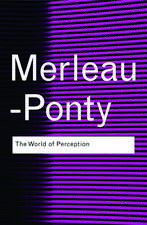Phenomenology and Virtue Ethics: Issues in Phenomenology and Hermeneutics
Editat de Kevin Hermberg, Dr Paul Gyllenhammeren Limba Engleză Hardback – 9 oct 2013
| Toate formatele și edițiile | Preț | Express |
|---|---|---|
| Paperback (1) | 257.50 lei 6-8 săpt. | |
| Bloomsbury Publishing – 22 apr 2015 | 257.50 lei 6-8 săpt. | |
| Hardback (1) | 774.20 lei 6-8 săpt. | |
| Bloomsbury Publishing – 9 oct 2013 | 774.20 lei 6-8 săpt. |
Preț: 774.20 lei
Preț vechi: 990.69 lei
-22% Nou
Puncte Express: 1161
Preț estimativ în valută:
148.16€ • 151.73$ • 123.25£
148.16€ • 151.73$ • 123.25£
Carte tipărită la comandă
Livrare economică 18 martie-01 aprilie
Preluare comenzi: 021 569.72.76
Specificații
ISBN-13: 9781780937021
ISBN-10: 1780937024
Pagini: 256
Dimensiuni: 156 x 234 x 23 mm
Greutate: 0.54 kg
Ediția:New.
Editura: Bloomsbury Publishing
Colecția Bloomsbury Academic
Seria Issues in Phenomenology and Hermeneutics
Locul publicării:London, United Kingdom
ISBN-10: 1780937024
Pagini: 256
Dimensiuni: 156 x 234 x 23 mm
Greutate: 0.54 kg
Ediția:New.
Editura: Bloomsbury Publishing
Colecția Bloomsbury Academic
Seria Issues in Phenomenology and Hermeneutics
Locul publicării:London, United Kingdom
Caracteristici
An
investigation
into
the
issues
related
to
virtue
ethics
in
the
phenomenological
tradition
and
method.
Notă biografică
Kevin
Hermberg
is
Associate
Professor
of
Philosophy
at
Dominican
College,
New
York,
USA.Paul
Gyllenhammer
is
Associate
Professor
of
Philosophy
at
St.
John's
University,
Queens,
NY,
USA.
Cuprins
Notes
on
ContributorsPhenomenology
and
Virtue
Ethics:
an
IntroductionKevin
HermbergPart
I:
Phenomenology
and
the
Tradition1.PhainomenonandLogosin
Aristotle's
EthicsLawrence
J.
Hatab2.
'Disimpropriation'
and
Infused
Virtue:
The
Question
of
(Christian)
Virtue
Ethics
in
the
Phenomenology
of
Michel
HenryMichelle
Rebidoux3.
Being
and
Virtuousness:
Toward
a
Platonic-Heideggerian
Virtue
EthicsMatthew
King4.
Horizon
Intentionality
and
Aristotelian
FriendshipEric
Chelstrom5.
Value,
Affectivity,
and
Virtue
in
Aristotle,
Scheler,
and
von
HildebrandGregory
B.
SadlerPart
II:
Theoretical
and
Contemporary
Comparative
Accounts6.
Phenomenology,
Eudaimonia,
and
the
VirtuesJohn
J.
Drummond7.
Phenomenology
and
Virtue
Ethics:
Complementary
Anti-Theoretical
Methodological
and
Ethical
Trajectories?Jack
Reynolds8.
Phenomenology
and
the
Virtues:
Scheler
and
von
HildebrandRobert
Wood9.
The
Self
that
Recedes:
A
Phenomenology
of
VirtueJ.
Jeremy
WisnewskiPart
III:
Application
of
Phenomenology
as
a
Virtue
Discipline10.
The
Virtues
of
Agency:
A
Phenomenology
of
Security,
Courage
and
CreativityJohn
Russon11.
Heideggerian
Perfectionism
and
the
Phenomenology
of
the
Pedagogical
Truth
EventIain
Thomson12.
Descent
to
the
Things
Themselves:
The
Virtue
of
DissentJohn
Duncan13.
Correlates
of
the
Good
Life:
Body,
Wilderness
and
ExpertisePaul
GyllenhammerReferencesIndex
Recenzii
Hermberg
and
Gyllenhammer
have
put
together
a
richly
informed
and
creative
collection
of
essays
that
offers
compelling
reasons
for
thinking
about
virtue
ethics
and
phenomenology
together.
Focusing
on
the
tradition
as
well
as
contemporary
debates,
the
volume
is
an
invaluable
resource
for
those
working
in
both
fields
and
for
anyone
who
questions
what
it
is
to
live
the
good
life.
Much as Edith Stein earlier in the 20th century worked to bring together Husserlian phenomenology and Thomism, the authors in this new volume definitively and carefully argue that phenomenology and virtue ethics have a great deal to say to each other. The quality of the articles is first-rate, and editors Gyllenhammer and Hermberg are to be commended on their excellent collection, which embraces both eminent, established voices in phenomenology as well as newer, rising stars. Clearly, this book will be of great use to faculty and to students in both undergraduate and graduate courses - primarily those in the history of philosophy, ancient philosophy, ethics, and phenomenology. However, the volume's main contribution lies not only in its essential re-visioning of the history of philosophy but also (and perhaps more importantly) in its creation of a meaningful, open-ended dialogue between pairs of Aristotelian and phenomenological concepts - such as friendship and horizon; flourishing and the lived-body; and habit and creativity.
Though the pairing of phenomenology and virtue ethics might initially seem forced or unconstructive, this collection of essays opens a dialogue between the two traditions that is both insightful and timely in showing various ways in which the two may be thought to converge. The book is structured in three parts that progress from dealing with specific areas of commonality between phenomenology and virtue ethics, to phenomenological accounts of virtue-exposing similarity and divergence among contemporary thinkers, to an attempt to show the virtue in the application of phenomenology. Contributors are recognizable in their respective fields, offering essays that, though accessible, are more appropriate to graduate students and professional academics than general or undergraduate readers. Given the breadth and depth of the specific philosophic traditions under discussion, a moderate amount of background knowledge in philosophy is assumed. For those who have it and who are interested in exploring various connections between these important and influential topics, this book is an excellent resource
Much as Edith Stein earlier in the 20th century worked to bring together Husserlian phenomenology and Thomism, the authors in this new volume definitively and carefully argue that phenomenology and virtue ethics have a great deal to say to each other. The quality of the articles is first-rate, and editors Gyllenhammer and Hermberg are to be commended on their excellent collection, which embraces both eminent, established voices in phenomenology as well as newer, rising stars. Clearly, this book will be of great use to faculty and to students in both undergraduate and graduate courses - primarily those in the history of philosophy, ancient philosophy, ethics, and phenomenology. However, the volume's main contribution lies not only in its essential re-visioning of the history of philosophy but also (and perhaps more importantly) in its creation of a meaningful, open-ended dialogue between pairs of Aristotelian and phenomenological concepts - such as friendship and horizon; flourishing and the lived-body; and habit and creativity.
Though the pairing of phenomenology and virtue ethics might initially seem forced or unconstructive, this collection of essays opens a dialogue between the two traditions that is both insightful and timely in showing various ways in which the two may be thought to converge. The book is structured in three parts that progress from dealing with specific areas of commonality between phenomenology and virtue ethics, to phenomenological accounts of virtue-exposing similarity and divergence among contemporary thinkers, to an attempt to show the virtue in the application of phenomenology. Contributors are recognizable in their respective fields, offering essays that, though accessible, are more appropriate to graduate students and professional academics than general or undergraduate readers. Given the breadth and depth of the specific philosophic traditions under discussion, a moderate amount of background knowledge in philosophy is assumed. For those who have it and who are interested in exploring various connections between these important and influential topics, this book is an excellent resource





















